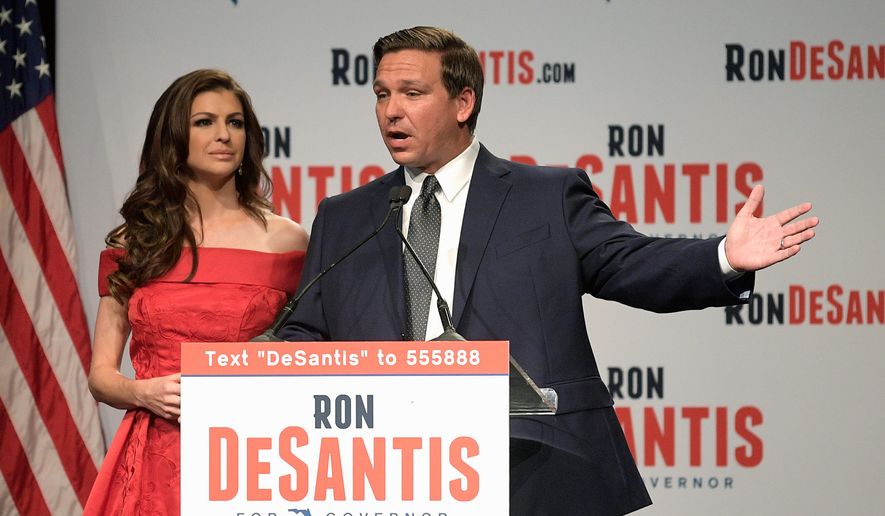Florida’s gubernatorial election in November will provide a blueprint if the 2020 presidential election becomes a battle between President Trump and an increasingly socialist Democratic Party.
Trump-backed Republican Rep. Ron DeSantis will face off against Tallahassee’s liberal mayor, Andrew Gillum, who rode to victory in Tuesday’s primaries with the endorsement of Sen. Bernard Sanders and left-wing activists.
“What you saw was really the passing of a generational torch here,” said Susan MacManus, a retired University of South Florida professor and the dean of political analysts in the state. “You saw the traditionally disaffected and ignored segments of each party rising.”
Mr. DeSantis quickly complicated his bid with some ill-chosen words Wednesday in which he warned Floridians not to “monkey this up” by electing Mr. Gillum — a phrase Democrats deemed “racist” because Mr. Gillum is black.
Mr. Gillum ran an unabashedly liberal campaign in earning 34 percent of the vote and defeating Democratic Rep. Gwen Graham and several others to win the party’s nomination.
He supports a $15-an-hour minimum wage. He supports Mr. Sanders’ plan for universal government-run health care and wants to see U.S. Immigration and Customs Enforcement abolished. And he proposed a tax increase with his candidacy in January, a whopping 40 percent raise in Florida’s corporate tax rate.
While defeating a batch of wealthy opponents, Mr. Gillum liked to joke he was the only candidate who wasn’t a millionaire or billionaire, but that doesn’t mean he doesn’t have big money behind him. Left-wing billionaires George Soros and Tom Steyer have signaled their willingness to disgorge in favor of the man seeking to become Florida’s first black governor.
The Miami Herald on Wednesday painted the Dade County native as “charismatic and proudly liberal,” a candidate who had delivered “a well-received message of social justice and lifting up the downtrodden and an appeal to Florida’s growing diversity.”
Displaying his political savvy, Mr. Gillum was careful in victory to avoid any polarizing language.
“I want you to know this thing is not about me,” he told supporters gathered in the capital. “This race is about every single one of us. Those inside this room; those outside this room. Those who voted for me; those who didn’t vote at all. And those who didn’t vote for me because they are Republicans. But I want to be their governor, too.”
Mr. DeSantis was less circumspect in his remarks the morning after his convincing primary win over state Agriculture Commissioner Adam Putnam.
“The last thing we need to do is monkey this up by trying to embrace a socialist agenda with huge tax increases and bankrupting the state,” Mr. DeSantis said.
National and state Democrats professed outrage.
“It’s disgusting that Ron DeSantis is launching his general election campaign with racist dog whistles,” Florida Democratic Party Chairwoman Terrie Rizzo said in a statement.
The DeSantis camp and national GOP officials labored to put the emphasis back on Mr. Gillum’s leftist platform.
Republican National Committee spokeswoman Taryn Fenske blasted out screen shots of tweets celebrating Mr. Gillum’s victory from Mr. Sanders and Alexandria Ocasio-Cortez, the Democratic nominee in a New York congressional race and, prior to Mr. Gillum’s emergence, the most trumpeted left-wing Democratic candidate this November.
“Socialist policies might be popular in places like New York, but they won’t win in Florida this November,” Ms. Fenske wrote.
The race is wide open, according to political experts in Florida. Steven Vancore, a Democratic consultant who has been warning Democrats not to rely on the anti-Trump message, has cast doubt on the idea there is a “blue wave” of enthusiasm in the Sunshine State, where more Republicans than Democrats voted in the gubernatorial primary.
He sees Mr. Gillum as a slight favorite.
“The showdown will come down to two things,” Mr. Vancore said. “One, who will excite their base the most, and two, who will win the swing vote. Both Gillum and DeSantis speak well to the bases. Now it is up to both to make a case to mainstream swing voters who will do the best to improve the quality of life.”
Mr. Vancore pointed to the economy and environmental disasters such as the red tide that have received wide publicity this summer as factors he believes will favor Mr. Gillum.
A factor that could hurt Mr. Gillum is an FBI investigation into Tallahassee contracts that has led to multiple subpoenas. Thus far, Mr. Gillum does not appear to be a target of the probe, but that’s unlikely to stop Mr. DeSantis’ campaign from using it as a weapon.
Adam Corey, a Tallahassee lobbyist with whom Mr. Gillum was close before reportedly cutting ties with him last year, is one target of the investigation, according to news outlets in the capital.
Most Floridians are not aware of the FBI investigation, Ms. MacManus said, and in any event Mr. Gillum’s freshness and race are huge advantages in a state “where the young and minority voters are much more racially and ethnically diverse.”
The key now, she said, will be each candidate holding on to the base that won them the primary. Mr. Gillum may struggle to convince independent and more traditional liberals that his ideas are reasonable, while Mr. DeSantis could have trouble holding on to establishment Republicans and women who find him too abrasive.
The polls may provide little guidance, given they failed to detect how large Mr. Gillum’s late surge was.
“That’s twice now the polls failed in terms of the late breaking votes down here,” Ms. MacManus said, pointing to Mr. Trump’s 2016 victory and the primary results. “Polls simply can’t measure enthusiasm and turnout.”
• James Varney can be reached at jvarney@washingtontimes.com.




Please read our comment policy before commenting.